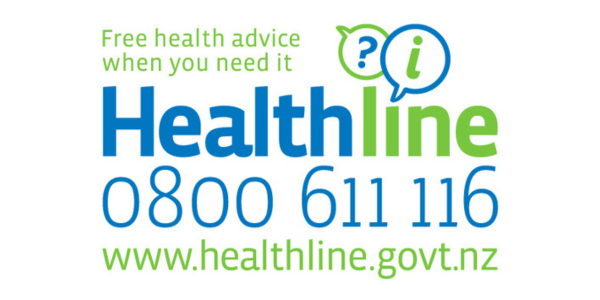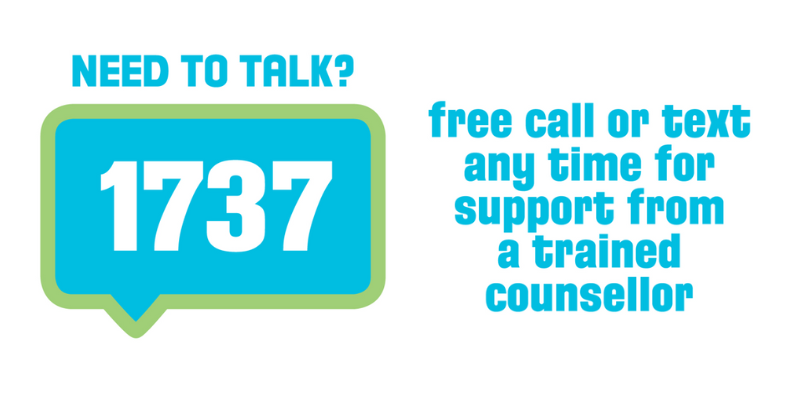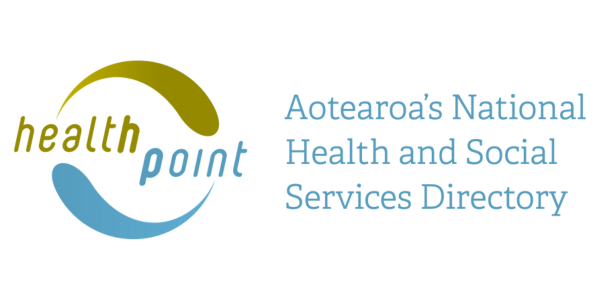Are you an NZ-based healthcare provider? Did you know we have a whole section on Healthify just for you, to assist in improving healthcare planning, delivery and outcomes?
Whooping cough
Also known as pertussis
Key points about whooping cough
- Whooping cough (pertussis) causes bouts of intense coughing and trouble breathing.
- Each bout may last for 2 or 3 minutes. The cough may go on for 3 months.
- It can cause serious illness and sometimes death in babies, young children and older adults.
- Whooping cough spreads very easily from person to person.
- Vaccination makes you less likely to get whooping cough and makes the illness milder if you do get it.
- A whooping cough epidemic has been announced in Aotearoa New Zealand (November, 2024) so watch out for signs. If you're a hapū māmā (pregnant person) it's important you get a free vaccination.
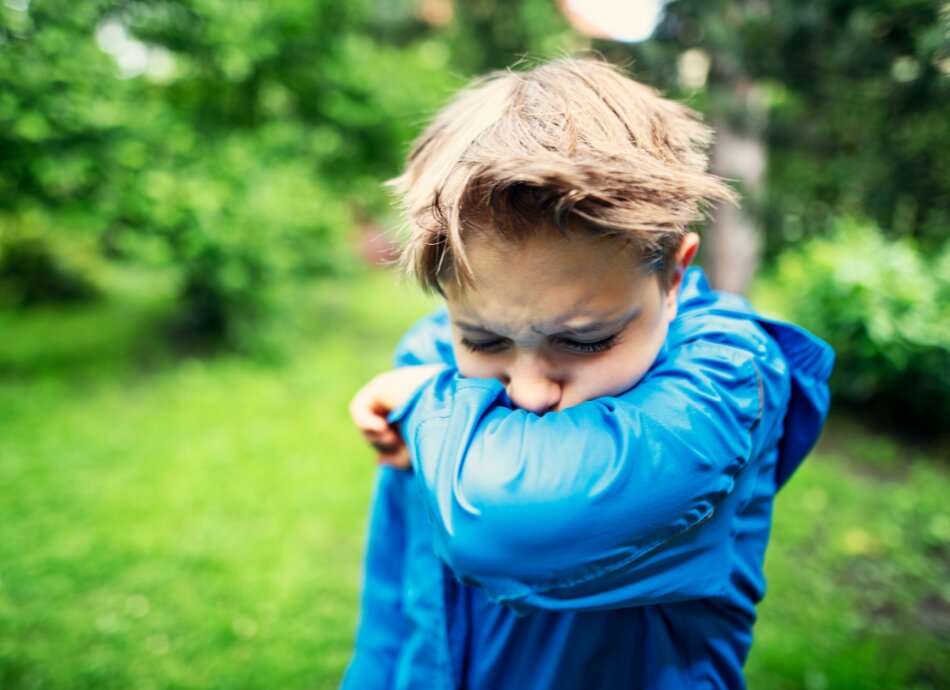
Public health alert 22 November 2024
There are high levels of pertussis cases and hospitalisations in Aotearoa New Zealand. As a result, the National Public Health Service and the Public Health Agency have declared a national whooping cough epidemic.
Whooping cough is affecting all age groups and ethnicities, with some hospitalisations amongst young babies and older people. Many schools are being affected across the country.
It's very infectious (easily caught), so it's important that as many people as possible are protected from catching it. Young children (less than a year old) are particularly at risk of severe illness and hospitalisation with whooping cough and it's recommended that they (and their whānau) get vaccinated against whooping cough. Read more about the free childhood immunisation programme in Aotearoa New Zealand, what's available and when they should be given.
If you're pregnant you can get a free Boostrix vaccination from 16 weeks. Others in your whānau are advised to get vaccinated against whooping cough as well but not everyone is eligible for a free vaccination. Read more about who is eligible and where you can get vaccinated.
When should I seek help?
Complications of whooping cough are most likely to happen in babies and young children.
See your healthcare provider if your child:
- is less than 1 year old and they've had contact with someone with whooping cough
- has a cough that goes on for a long time without any pauses, or has a cough that ends in vomiting (being sick)
- has had a daily cough that lasts longer than 2 weeks
- is less than 3 months old and has a cough.
Dial 111 for urgent medical help if your child:
- goes blue when coughing
- is struggling to breathe
- stops breathing
- has a seizure
- is becoming very sleepy and not easy to rouse (wake up).
Whooping cough is an infection caused by a bacteria called Bordetella pertussis. This is why the illness is sometimes called pertussis. The cough can go on for weeks or months which is why it's sometimes called 'the hundred day cough'. A ‘whoop’ is the sound you sometimes make when you breathe in deeply after coughing. Sometimes you can vomit after a bout of coughing.
Whooping cough can be very serious in babies, young children and older adults. Older children are usually less unwell but the cough and vomiting can be distressing. Adults may just have an irritating cough that goes on much longer than usual.
Video: Protect tamariki from whooping cough
(KidsHealth NZ, 2023)
Video: What is That Sound? Whooping Cough
(US Food and Drug Administration, 2022)
Whooping cough affects you differently depending on your age.
Babies under 6 months
Whooping cough in young babies is unpredictable and can get worse very quickly. Babies aged less than 6 months old don't usually whoop.
They may:
- stop breathing
- go blue with bad coughing bouts
- seem to have a cold, then cough and have difficulty breathing
- get exhausted from coughing
- not be able to feed because of coughing
- lose weight because of trouble feeding and because the cough makes them vomit (be sick).
Older babies and young children
In older babies and young children the illness has 3 stages:
The early stage
It starts with a sore throat, runny nose, mild fever and sneezing – just like a cold. This lasts 1 or 2 weeks.
The second stage
Next, there is an irritating cough. Over a week or two, the cough gets worse and comes in bouts. Children gasp for air between each bout of coughing. They get very red in the face. These spells last 1–3 minutes and they may vomit food or spit (phlegm) after the coughing. The cough often gets worse with swallowing or eating. In between bouts your child is likely to be well.
The final stage
The final stage is the long recovery stage. The symptoms gradually get milder, but the cough continues for weeks.
Older children and adults
Older children and adults mostly have a long-lasting irritating cough and some still get a severe illness.
Whooping cough can last for weeks or months. If you get a cold in the weeks after you have recovered from whooping cough, bouts of coughing can come back for a while.
Whooping cough is not under control in Aotearoa New Zealand. Every 3 to 5 years there are outbreaks with thousands of people (mostly young children) affected.
More than half of babies under 1 year of age who get whooping cough need to be treated in hospital, and 1 or 2 of every 100 hospitalised babies will die. Having whooping cough can lead to pneumonia, seizures, paralysis, permanent brain damage, deafness and blindness.
Bordetella pertussis bacteria infect the lining of your nose, throat and breathing tubes. Whooping cough is very easy to catch. It is passed from person to person by coughing and sneezing. On average, each person with whooping cough passes the infection on to 12 other people.
A person with whooping cough is likely to be infectious from the week before they start coughing to 3 weeks after the cough begins. Parents or older children in the family with whooping cough can easily pass it on to babies who are too young to have fully completed their course of vaccinations.
If you think you or your child may have whooping cough, get an assessment by your healthcare provider as soon as possible. Make sure you tell the receptionist about the cough when you phone to book an appointment as you will need to be kept separate from other people in the surgery. Older children and adults will need to wear a mask.
Your healthcare provider may be able to diagnose whooping cough after asking questions about your symptoms and doing an examination. They may take a nose and throat swab and send it to the laboratory to check for pertussis bacteria and/or test for COVID-19. A whooping cough swab will only show up positive in the early stages of the disease. Your healthcare provider may ask for a blood test, but not usually.
Your immune system will get rid of the bacteria after 3 or 4 weeks without any treatment but the damage caused to your breathing tubes takes longer to repair. There's no medicine that will stop the cough once it has started. Cough medicine won't ease the coughing and isn't recommended for young children.
Mild cases of whooping cough can be treated at home. Stay at home and away from people who are not in your family/whānau bubble (especially babies and children) for 3 weeks. This is to stop the infection spreading. If you're taking antibiotics, this isolation time goes down to 5 days from the day the antibiotics were started.
Make sure you and your child get as much rest as you can. Caring for your child with whooping cough is hard work, and the cough is often worse at night. Encourage them to have small healthy meals and plenty of fluids.
If the cough is painful you can use paracetamol for pain relief. Make sure you follow directions and measure children's doses accurately. Never give more than the recommended dose. If you're not sure how much to give them, ask your healthcare provider or pharmacist for advice.
These things may help them feel more comfortable:
- sipping warm drinks
- reducing dry air, by using a humidifier in the bedroom
- using saline nose drops to help remove thick mucus
- drinking lots of clear fluids
- avoiding coughing triggers, like cigarette smoke, perfumes or car fumes.
See your healthcare provider if your child:
- is less than 1 year old and they have had contact with someone with whooping cough
- has a cough that goes on for a long time without any pauses, or has a cough that ends in vomiting (being sick)
- is less than 3 months old and has a cough.
Dial 111 for urgent medical help if your baby:
- goes blue when coughing
- stops breathing
- has a seizure
- is becoming very sleepy and not easy to wake up.
There's no medicine that will stop the cough once it has started.
Antibiotics
Antibiotics may make whooping cough less serious if started very early, before the coughing starts. This is only useful if you've been in contact with a known case of whooping cough and you're at high risk of severe disease – contact your healthcare provider if you think this might be you.
If whooping cough is diagnosed during the first 3 weeks of the infection, your doctor may prescribe antibiotics. This helps to prevent the bacteria from spreading to other people. If started early, antibiotics can reduce the amount of time you are infectious to others from about 3 weeks to 2 to 5 days.
Hospital treatment
Young children and older adults who are very unwell with whooping cough may need to stay in hospital. Sometimes whooping cough makes it hard to breathe and drink, so hospital treatment may include:
- oxygen by a tube under your nose
- fluids by an intravenous drip (into a vein), or by nasogastric feeding (feeding through a tube passed through your nose or mouth into your stomach).
Apps reviewed by Healthify
You may find it useful to look at some Breathing apps.
Vaccination is the best way to protect against whooping cough
You need whooping cough vaccinations throughout your life. In Aotearoa New Zealand, the pertussis vaccine for whooping cough is free for pregnant people, all children under 18 years old and adults from 45 and 65 years old.
Children under 18 years of age
Children can receive the pertussis vaccine as part of the NZ Immunisation Schedule. It's a course of 3 injections that are given at ages 6 weeks, 3 months and 5 months. Two booster doses are then given at ages 4 years and 11 years. These vaccinations are all free, including catch ups for missed doses for young people up to the age of 18 years.
Pregnant people
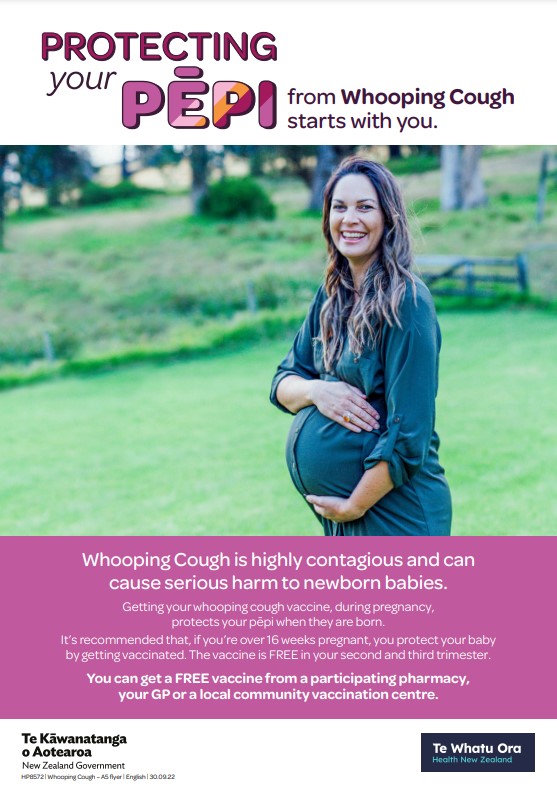
The best protection for babies is for their mother to be vaccinated during pregnancy and then for the baby to have their vaccinations on time. A booster dose of the pertussis vaccine is recommended for every pregnancy and is free during the second or third trimester. It's available from your general practice and through some pharmacies. To find a local vaccine provider go to Healthpoint(external link) then enter Diphtheria/ Tetanus/ Pertussis into the search bar, and your region into the location box.
When you're vaccinated during pregnancy, your body makes antibodies that pass through the placenta. This protects your baby from severe whooping cough for the first few months of life, until they have had their own vaccine and can make their own longer-term protection. Breastfeeding alone does not provide effective protection against whooping cough. Read more about pregnancy and immunisation.
Adults
Most cases of whooping cough in babies are passed on by whānau members, as you can be infectious and pass it on without realising. People who are around pregnant mums and babies should have a whooping cough vaccination. This includes people in the household and other close whānau members such as grandparents.
The protection you get from vaccination reduces over time and some adults are recommended to have a whooping cough booster at least every 10 years. Check with your healthcare provider if you don't know if you might need a booster injection. This is funded at 45 and 65 years. Read more about the the pertussis vaccine for whooping cough.
If you or your child has whooping cough:
Isolate: To reduce the risk of infecting others, stay at home until you are feeling well AND you have either:
- taken 2 days of the antibiotic called azithromycin or 5 days of another antibiotic, or
- 3 weeks have passed since the start of the coughing bouts, or
- you've been advised by your healthcare provider that you're no longer infectious.
During your stay at home (isolation) time, you must stay away from early childhood centres, kohanga reo, school, work, community gatherings and people outside your family/whānau bubble.
Tell your close contacts: Anyone you've spent more than 1 hour with at closer than 2 metres distance is at risk of catching whooping cough. Tell these people that you have whooping cough and that they need to get advice from their healthcare provider. They may need to have a vaccine, stay at home or take a preventative antibiotic.
Cover coughs and sneezes: Follow good hygiene practice for covering coughs and sneezes.
Wash your hands often: Follow good hygiene practice for hand washing.
Whooping cough (pertussis) |Te mare tekekō(external link) Health New Zealand | Te Whatu Ora
Pertussis(external link) The Immunisation Advisory Centre, NZ
Immunisation during pregnancy(external link) The Immunisation Advisory Centre, NZ
Apps
Breathing apps
Self-management and healthy living apps
Brochures
Protecting you and your pēpi starts during pregnancy(external link) Health Ed, NZ
Pertussis (Whooping Cough) – factsheet NSW Multicultural Health Communication Service, Australia. Available in Arabic(external link), Chinese (traditional)(external link), English(external link), Farsi(external link), Khmer(external link), Korean(external link), Thai(external link), Vietnamese(external link), more languages(external link)
Childhood immunisation booklet(external link) HealthEd, NZ
Don't delay – immunise now for whooping cough(external link) Immunisation Advisory Centre and Ministry of Health, NZ
References
- Pertussis (whooping cough)(external link) (Immunisation Handbook 2024 version 5(external link)) Ministry of Health, NZ
- Pertussis(external link) Immunisation Advisory Centre, NZ
- Pertussis(external link) Auckland Regional HealthPathways, NZ
- Whooping cough(external link) KidsHealth, NZ
Public health alert (22 November 2024)
Due to ongoing high levels of pertussis cases (and hospitalisations) occurring consistently across the motu over the last several weeks, the National Public Health Service (NPHS) and the Public Health Agency is now declaring a national epidemic. We are asking healthcare professionals to please remain vigilant for people presenting with symptoms and to continue to promote vaccinations to protect vulnerable groups.
Vaccination
- Advise pregnant people particularly hāpu māmā of the increase in pertussis and recommend free Boostrix vaccination from 16 weeks in every pregnancy as it’s the best way to protect their newborn.
- Pertussis vaccination should be encouraged for the extended whānau of pregnant people, new babies and infants, although depending on their age they may not be eligible for a funded vaccine.
- Continue to prioritise on time immunisation for all babies at 6w, 3m and 5m and pertussis boosters at 4 years and 11 years for children.
- Encourage all staff, including reception and administrative staff, to be protected from pertussis as well as influenza and measles. Booster vaccinations are recommended 5-10 yearly depending on employer requirements for all lead maternity carers and healthcare workers who are in direct contact with infants.
- Adults aged 45 years (if they haven’t already had 4 vaccines) and 65 years are also eligible for a free pertussis booster.
Testing, treatment and isolation
- Pertussis PCR is the recommended test for people presenting with whooping cough characteristic symptoms, including onset of upper respiratory tract infection with cough; post-tussive vomiting, apnoea or cyanosis; an inspiratory whoop following cough in younger children noting infants may not whoop; gasping or gagging instead of whooping in older children and adults.
- PCR testing is useful within 3 weeks of symptom onset. Probable and confirmed cases need to isolate at home for 5 days from starting antibiotic treatment or 2 days if treated with azithromycin.
- Epidemiologically linked cases do not need to be tested but should be notified as cases.
To reduce transmission, treatment is recommended for cases within 3 weeks of onset of symptoms. Antibiotic prophylaxis is recommended for high priority contacts within 3 weeks of exposure to an infectious case.
High priority contacts include:
- infants aged younger than 1 year who have received <3 doses of a pertussis-containing vaccine, especially those aged <6 months and/or Māori and Pacific infants
- pregnant people in their last trimester of pregnancy
- people who work or spend extended time with vulnerable people outside the household, eg, early childhood centre, aged residential care, healthcare settings
- people at risk of severe disease, eg, chronic respiratory disease, congenital heart disease, immunocompromised children aged <5 years who are unimmunised or partially immunised.
Treatment of symptomatic or high priority contacts
Follow the guidance available on HealthPathways for antibiotic treatment of symptomatic and high priority contacts. Guidance is also available in the Communicable Diseases Manual. (external link)The recommended prophylactic antibiotics and dosages are the same for case treatment and prophylaxis for high-risk contacts.
Please notify suspected cases of pertussis to your local Public Health Service.
Resources
Pertussis (whooping cough) immunisation handbook(external link) Health New Zealand | Te Whatu Ora, NZ
Copan PCR swab image(external link)
Microbiology swabs and collection tubes(external link) Medinz, NZ, 2023
Te Whatu Ora clinical reminder: 9 March 2023
Te Whatu Ora is encouraging healthcare providers and professionals to be alert to the symptoms of pertussis/whooping cough and to encourage immunisation due to concerns about potential underlying community spread.
This comes following the recent tragic deaths of two people from whooping cough.
Pertussis is serious in very young children – during the last outbreak from October 2017 to May 2019, 50% of children with pertussis, who were aged under 1 year old, required hospitalisation.
Healthcare providers should consider pertussis as a possible alternative diagnosis, particularly in babies under 3 months with respiratory illness who may not present with the characteristic whoop. Be aware of the red flags of a seriously ill infant:
- apnoea
- dehydration
- lethargy
- cyanosis or O2 saturations <92%
- fever ≥ 38 degrees C.
And also consider early admission to hospital if any concerning clinical features:
- Poor feeding, with or without reduced urine output.
- History of prematurity.
- Infants aged < 3 months.
- Children with a history of chronic respiratory disease, cardiac disease, neuromuscular disease, or immune deficiency.
- Reduced alertness and responsiveness.
- Repeat presentations in this illness.
Any child less than 3 months of age with respiratory symptoms, whose caregiver has presented them for triage (via phone) should have a low threshold for offering an in-person assessment.
Free antenatal pertussis vaccination, with Boostrix, is available from general practice and also through many pharmacies across New Zealand. It can be given from the second trimester of every pregnancy and is recommended to have from 16 weeks, but at least 2 weeks before birth.
The whooping cough (pertussis) vaccination is free for:
- all children and young people aged under 18 years
- pregnant people for every pregnancy
- all adults at 45 and 65 years of age as immunity reduces (same vaccine as the tetanus booster)
- some groups at higher risk of becoming very unwell if they catch whooping cough (eg, chronic respiratory conditions, congenital heart disease or immunocompromised).
View the whooping cough pathway on your local HealthPathways site for information. Immunisation resources are available to download here(external link).
Practice notes
- Pertussis is a notifiable disease. Clinically suspected or laboratory confirmed cases must be notified to the Medical Officer of Health.
- Patients should be advised to avoid contact with others, especially infants and children, until at least 5 days of antibiotic treatment has been taken (2 days if azithromycin is used).
- Children with pertussis can deteriorate rapidly and may require hospitalisation.
Credits: Healthify editorial team. Healthify is brought to you by Health Navigator Charitable Trust.
Reviewed by: Dr Emma Dunning, Clinical Editor and Advisor
Last reviewed:
Page last updated:


